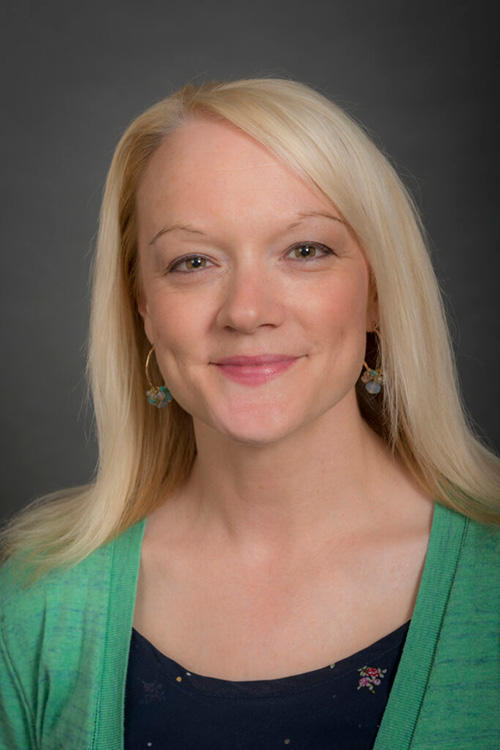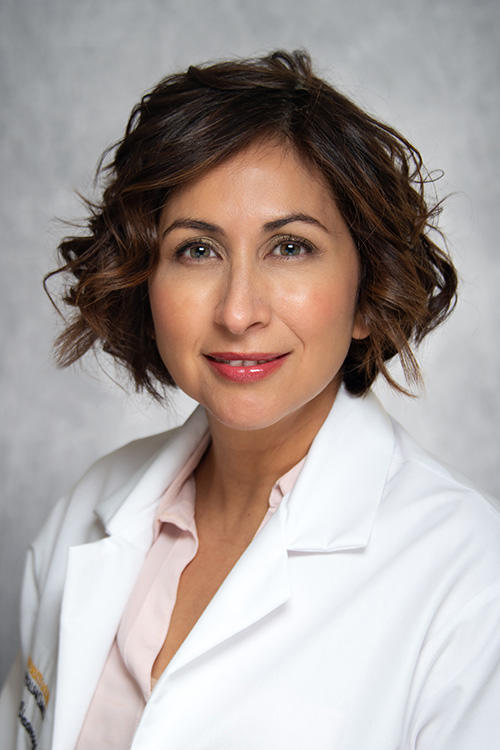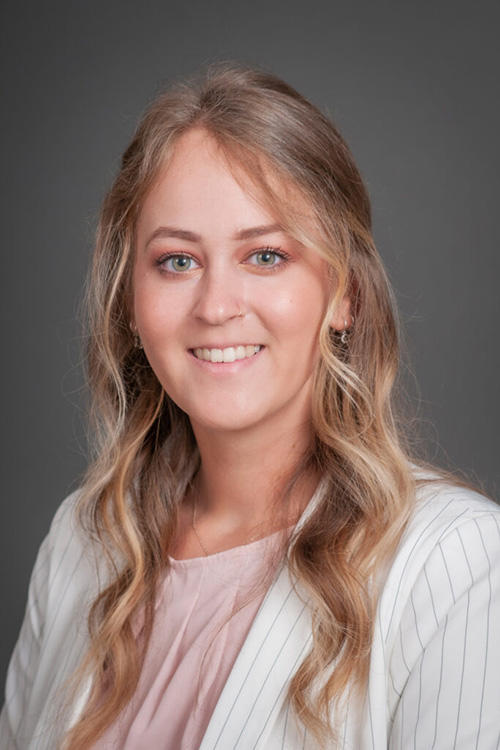By establishing the Iowa Cancer Affiliate Network, the University of Iowa aims to support community hospitals across the state in the delivery of comprehensive cancer care to rural Iowans.
Story: Sara Epstein Moninger
Videography: David Scrivner
Published: March 26, 2024
By many measures, cancer care at St. Anthony Regional Hospital in west central Iowa is going well. The 99-bed hospital located in Carroll, Iowa, a community of 10,000, opened an adjacent cancer center in 2020. It offers medical oncology, radiation oncology, and infusion therapies and draws some 15,000 patients a year from a 17-county area.
But Lori Pietig, the hospital’s director of cancer services, has seen the bleak outlook put forth in the 2024 Cancer in Iowa report: The state of Iowa has the second-highest and fastest-growing rate of new cancers in the U.S., with rural populations experiencing greater cancer mortality than urban ones. She knows there is room for improvement.
So, when the opportunity arose for rural hospitals like St. Anthony to receive guidance and support from University of Iowa cancer experts by joining the Iowa Cancer Affiliate Network, or I-CAN, Pietig seized it.
“With smaller centers like ours, everybody wears many hats, and we try not to burn our staff out by piling more work on them. That said, we have seen a minimum of a 20% increase each year in new patient referrals and continue to get about 15 new referrals a week,” says Pietig, a Carroll native who served the hospital as director of radiology before becoming its first-ever cancer services director in 2020. “Although our days are full, we see an opportunity for growth, and I-CAN is helping us plan for it.”
St. Anthony is one of six hospitals serving rural populations across the state that are participating in the network, which is coordinated by UI researchers and clinicians in partnership with the UI Holden Comprehensive Cancer Center. The hospitals—which also include Mahaska Health in Oskaloosa, MercyOne Clinton, MercyOne Dubuque, Southeast Iowa Regional Medical Center in West Burlington, and Spencer Hospital—receive reports about common cancers and risk factors specific to the populations they treat, assistance with collecting data to achieve Commission on Cancer standards, strategic planning guidance on expanding their cancer services, educational opportunities and training, and access to clinical trials, among other things.
“There used to be this mentality that if you wanted the best cancer care, you had to go someplace else, a bigger center like Mayo Clinic or the University of Iowa, and that’s not always true,” Pietig says. “You can access quality treatment and have a very supportive staff close to home. I-CAN is trying to elevate that care by giving hospitals like ours the resources we need to be held to the same standards as comprehensive cancer centers, while also giving us a stamp of approval so that patients and their families can feel confident about coming to see us for care.”
Iowa’s role in advancing cancer medicine
Cancer is among the leading causes of death worldwide, and it is predicted that two in five Iowans will be diagnosed with the disease in their lifetime, according to the 2024 Cancer in Iowa report. Experts at the University of Iowa Holden Comprehensive Cancer Center are dedicated to fighting cancer and improving therapies.
With its “comprehensive cancer center” designation from the National Cancer Institute, Holden is one of 51 institutions across 36 states—and the only one in Iowa—recognized for its leadership, resources, and research in cancer medicine.
“Local providers are doing an amazing job considering the limited resources they’re working with, but we want all Iowans to get the best care possible regardless of where they live. You shouldn’t be at a disadvantage because you live in a rural area. You should be able to get really good care close to your home, and that’s what we’re trying to support.”
Establishing the network
Through her work as director of the Iowa Cancer Registry and professor of epidemiology in the UI College of Public Health, Mary Charlton saw that many hospitals in Iowa were treating a high volume of cancer patients but were not collecting or monitoring data on the quality of their cancer care, something needed to be accredited by the Commission on Cancer—and to improve outcomes for patients. That was cause for concern, and she reached out to Ingrid Lizarraga, a UI breast surgeon and the state chair for the Commission on Cancer.
“We asked ourselves, what if we built a network to extend Holden’s resources out and help these hospitals do some of the things they need to do to meet these standards? They don’t have to figure it out by themselves and reinvent the wheel,” says Charlton, who received a five-year grant from the National Cancer Institute in 2021 to develop the network. “We can be good subject matter experts and help train them. We can even loan a person from the Iowa Cancer Registry to work closely with them and help collect their data.”

Mary Charlton
Meeting standards set by the Commission on Cancer, whether or not the hospitals formally apply for accreditation, benefits the entire state, Charlton says.
“Local providers are doing an amazing job considering the limited resources they’re working with, but we want all Iowans to get the best care possible regardless of where they live. You shouldn’t be at a disadvantage because you live in a rural area,” Charlton says. “You should be able to get really good care close to your home, and that’s what we’re trying to support.”
Lizarraga, who serves as I-CAN’s medical director, visits with the hospitals to see what services they currently offer and to understand their challenges and goals, and then works with them to identify opportunities for growth and improvement. Quality cancer care is multifaceted, she says.
“When you think about cancer treatment, you think about diagnosis, about surgery, about chemotherapy and radiation, and that’s one area of services that may be limited. But we’ve found that an even bigger gap exists for supportive services, such as genetic counseling, talking to a dietitian to help you with your care, access to specialized rehab, and good survivorship follow-up.”
Not only do I-CAN hospitals have access to a password-protected website with resources, their health care professionals also can sign up for educational webinars, gain feedback on what they are doing, participate in a collaborative consult program, and learn how to establish a tumor board, a group of expert cancer providers who meet regularly to review and discuss cases. The network also collaborates with the Iowa Cancer Registry to support cancer data collection and analysis that can be used for quality improvement and planning resource allocation.
Lizarraga spent several years as a general surgeon in West Burlington before coming to Iowa for a fellowship in breast surgery and joining its surgical oncology faculty. She says another valuable aspect of the network is the interaction it facilitates between the community partners.
“It allows the hospitals to share their ideas with each other, and sometimes they come up with things together that work well because they have similar barriers or resources. For example, a solution that works at the University of Iowa may not be appropriate for West Burlington, but a solution in West Burlington may translate well to Carroll or to Spencer,” Lizarraga says. “Plus, it fosters a sense of community among the hospitals and among the providers. Often these hospitals have just one medical oncologist or one radiation oncologist, and it can be lonely. It’s important to have colleagues to bounce ideas off, and this network can provide that community of clinicians.”

Ingrid Lizarraga
“[The network] allows the hospitals to share their ideas with each other, and sometimes they come up with things together that work well because they have similar barriers or resources. For example, a solution that works at the University of Iowa may not be appropriate for West Burlington, but a solution in West Burlington may translate well to Carroll or to Spencer.”
Planning for the future
As an MD-PhD student in Iowa’s Medical Scientist Training Program, Madi Wahlen has been working with I-CAN as a graduate research assistant, facilitating data collection and implementation. She says the experience has been eye opening.
“As a medical student, you’re in hospitals all the time, but I never realized how they operate and the challenges that they face, especially smaller hospitals with resource limitations,” she says. “It’s been surprising to see how many different roles people at these smaller hospitals are playing—partly because they have to, but also because they want to provide the best care to their patients.”
Charlton says she’d like to see the network expand so that all interested hospitals can participate.
“Our goal is to develop a sustainable infrastructure to support and grow our network such that every Iowan has access to comprehensive, high-quality care close to home, and every cancer care provider has access to the support and resources they need to offer comprehensive, high-quality care to their patients,” she says. “It might take some time, but I think we’re making a huge difference.”
Pietig agrees and says being part of the network gives her hope that the quality of cancer care will improve for all Iowans.
“I just can’t say enough about the entire team at I-CAN. They want to make us better, and they keep at it,” Pietig says. “I’ve had staffing challenges that have prevented me from focusing a lot on this project, but they keep the conversation going. They have helped with recruitment and are always available to serve as a resource and provide a helping hand.”

Madi Whalen